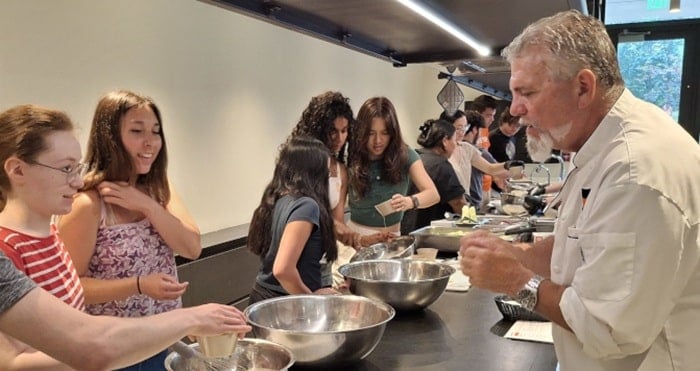
Students explore the magic of olive oil. Credit: Greek Liquid Gold
Princeton University’s Summer Research and Learning Village recently hosted an event focused on exploring olive oil. Students gathered for a hands-on, tasty exploration of a key component of the famously healthy Mediterranean diet. They ate olive oil cake, tasted extra virgin olive oil, learned about it, and made a Greek salad with an olive oil vinaigrette.
By Lisa Radinovsky, editor of Greek Liquid Gold
On the evening of June 25, students joined Campus Dining and Princeton alum Lisa Radinovsky (class of 1990) to consider what Greeks have called liquid gold from ancient times to the present. Campus Dining chefs had prepared a luscious fudge cake using Clementine-flavored olive oil donated by Laconiko, a Greek olive oil company headquartered in Virginia. Students enjoyed slices of this cake as they introduced themselves, discovering that olive oil works very well for baking.
Presenting olive oil at Princeton
Moreover, students learned that extra virgin olive oil can be used in all types of cooking, as well as for sauces, dressings, and finishing everything from main dishes to ice cream. Radinovsky’s presentation featured numerous photos from Greece, where she has been learning and writing about olive oil for ten years. She discussed
• extra virgin olive oil’s numerous benefits for human and planetary health
• the importance of olive oil in Greece (with average consumption 12 liters per person per year, vs. 1 in the USA)
• olive oil in ancient Greek mythology and athletics
• how olive oil is made, using either traditional or modern machinery
• what gives extra virgin olive oils different flavors
• the definitions of virgin and extra virgin olive oil
• more than a dozen dishes made with olive oil
• an easy recipe for a one-pan chocolate olive oil cake
• advice on how to select and store olive oil
• a famous, sculpturesque 3,000 to 5,000 year old olive tree in Crete
• how to taste olive oil (sipping from a cup, as olive oil sommeliers do)
• the aromas and flavors in the olive oils we tasted
As the presentation concluded, students tasted three extra virgin olive oils (EVOOs) from different olive varieties and locations: the Colavita extra virgin olive oil used by Campus Dining–a mild, balanced blend of varieties from several countries–and two more robust early harvest Greek EVOOs donated by their producers.
Laconiko extra virgin olive oil comes from Koroneiki variety olives grown in Laconia, Peloponnese, southern Greece, while Yanni’s Olive Grove’s Finest extra virgin olive oil is made from Chondroelia Chalkidiki olives in Chalkdiki, northeastern Greece. Students noticed the aroma of fresh-cut grass and herbs in the Greek olive oils, as well as a peppery spiciness in the back of their throats that indicates exceptional health benefits.
Using olive oil at Princeton
After sampling the olive oils, it was time to make and eat a Greek salad and a homemade olive oil vinaigrette dressing. Chef Michael Gattis, Culinary Associate Director at Princeton University Campus Dining, instructed students on the fine points of making a salad and dressing, then provided advice as they got to work.
The students enjoyed chopping, mixing, adding, whisking, blending, tasting, and refining their salads and dressings. Tasting each other’s creations, they noticed subtle flavor differences based on the way each group had adjusted seasonings according to their preferences.
After savoring their salads, the students left the Exploring Olive Oil event with extra cake, recipes, cooking experience, and a new understanding of how and why to use olive oil.
This event took place at Princeton University, with logistical support provided by university staff and alumni. This post is shared and does not imply endorsement or promotion by Princeton University.
Originally published on Greek Liquid Gold: Authentic Extra Virgin Olive Oil (greekliquidgold.com). See that site for recipes with olive oil, photos from Greece, agrotourism and food tourism suggestions, and olive oil news and information.
Related: International Yale Symposium Examines Olive Oil and Health

Dining and Cooking